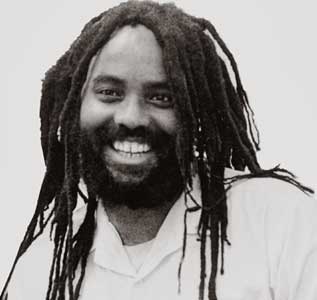Dangerous legal exception for Mumia
By
Betsey Piette
Philadelphia
Published Jan 28, 2010 9:34 PM
On Jan. 19 the U.S. Supreme Court issued a ruling that has opened the way for
the reinstatement of the death sentence for Mumia Abu-Jamal. The federal
court’s ruling, which moved away from earlier rulings regarding
sentencing phase regulations, was the latest in a long history of state, local
and federal courts changing or even reversing their own legal precedents in the
case of this world-renowned journalist and political prisoner.
In fact, throughout over 28 years of legal proceedings in Abu-Jamal’s
case, there have been so many instances in which courts reversed earlier
decisions made in similar cases in order to rule against the U.S.’s most
famous death row prisoner that Linn Washington Jr., a professor of journalism
at Temple University, coined the phrase “the Mumia exception” to
describe these rulings.
The Supreme Court’s decision granted the Philadelphia district
attorney’s petition for a review of a 2001 ruling by Federal Judge
William Yohn which overturned Abu-Jamal’s death penalty but not
conviction. The Supreme Court went against this lower federal circuit
court’s findings as well as the 2008 Third Circuit ruling which granted a
new sentencing phase jury trial if the death penalty was to be reinstated in
Abu-Jamal’s case. Now the case goes back to the Third Circuit Court of
Appeals to decide whether to reimpose the death penalty without the jury
trial.
In the week before the Jan. 19 decision the Supreme Court ruled on Smith v.
Spisak, a case that also involved questionable instructions to the jury during
the sentencing phase, although the case differs from Abu-Jamal’s in legal
and political aspects.
Neo-Nazi and white supremacist Frank Spisak killed three people and then
bragged about it in court. Abu-Jamal, a former Black Panther organizer, was
convicted of killing Philadelphia police officer Daniel Faulkner on Dec. 9,
1981, but has always maintained his innocence, and several prosecution
witnesses from his 1982 trial have since recanted their testimony.
Spisak’s lawyers had appealed based on the 1988 Supreme Court ruling in
Mills v. Maryland, which addresses confusing jury instructions. The Sixth
Circuit Court of Appeals had overturned Spisak’s sentence based on Mills
but the U.S. Supreme Court decided the standard did not apply in his case.
It would appear that the court, which had had the district attorney’s
appeal of Yohn’s decision before them since 2001, was waiting for a case
like Spisak’s so they could justify their reversal in Abu-Jamal’s
case, even though the two cases and the two defendants differ as night from
day. Even though Abu-Jamal’s case met the Mills standard, the Supreme
Court refused to apply it, in what was clearly a decision motivated by politics
and not law.
Abu-Jamal’s attorney, Robert R. Bryan, stated, “What occurred in
Mumia’s case is different both procedurally and factually from the jury
instructions in Spisak.”
A racist frame-up
Abu-Jamal’s supporters, including Amnesty International, members of the
U.S. Congressional Black Caucus, the NAACP, and government leaders from France,
Japan, Germany, South Africa and many others, say he was framed by police, that
prosecution witnesses were coerced into false testimony by the police, and that
ballistics evidence shows Abu-Jamal did not shoot Faulkner.
Abu-Jamal has also been the victim of a racist and notoriously pro-prosecution
trial judge, now-deceased Albert Sabo, who ruled at the initial trial in 1982
and then was called back from retirement to preside at Abu-Jamal’s 1995
Post Conviction Relief Act hearing. According to a sworn affidavit by court
stenographer Terri Maurer-Carter, Sabo was overheard to say, “Yeah, and
I’m going to help them fry the n — — r.”
At a Jan. 20 press conference and rally outside the offices of Seth Williams,
Philadelphia’s first Black district attorney, Kevin Price with Friends of
MOVE stated, “The U.S. Supreme Court’s decision shows that
something is clearly broken in the U.S. justice system.
“Mumia’s case contains every type of evidence that existed in other
cases where death row prisoners were exonerated — tampered evidence,
witnesses changing their testimony, and a clearly racially biased judge. If a
case as glaringly unjust as Mumia’s is not thrown out, what does this say
for thousands of other innocent people on death row and the millions
incarcerated across the U.S.?”
Pam Africa, chairperson of International Concerned Family and Friends of Mumia
Abu-Jamal, said: “Mumia cannot get any fairness in this court system.
Seth Williams ran on a platform that when he became district attorney, he would
execute Mumia.”
Africa urged people to stay focused and to show their support right now by
signing and circulating two petitions calling for civil rights investigations
into this case. One petition is directed to U.S. Attorney General Eric Holder
and the second to President Barack Obama. Both are available at
www.freemumia.com and www.millions4mumia.org.
“Time is running out,” Africa stressed. “The time for
organizing is now, organizing with all the strength that you have. Tell the
people they must get into the streets in order to save this brother who has
been on the front lines, from death row, on every issue of social justice that
there is.” (San Francisco Bay View, Jan. 20)
These sentiments were echoed by Berta Joubert-Ceci, of the International Action
Center, who told Workers World: “The governor of Pennsylvania signed a
death warrant to execute Mumia in 1995, but the people mobilized and forced
them to back down. We have the power to stop this.”
Chants of, “Brick by brick wall by wall, we’re gonna free Mumia
Abu-Jamal!” from protesters outside the district attorney’s office
Jan. 20 and the sounds of car horns honking in response to “Honk for
Mumia” signs demonstrated that people are ready to fight back.
Articles copyright 1995-2012 Workers World.
Verbatim copying and distribution of this entire article is permitted in any medium without royalty provided this notice is preserved.
Workers World, 55 W. 17 St., NY, NY 10011
Email:
ww@workers.org
Subscribe
wwnews-subscribe@workersworld.net
Support independent news
DONATE


